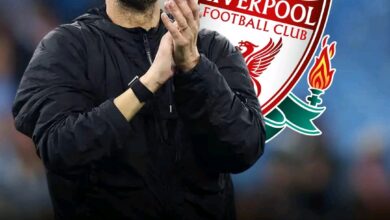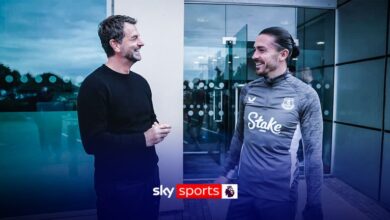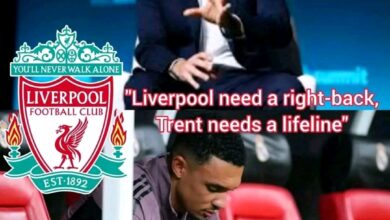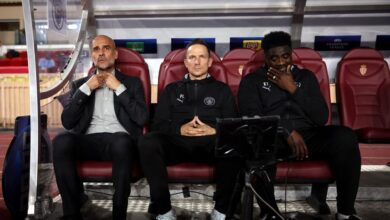Lightning Strikes: How Liverpool’s Panic Buy Became Their Trophy Catalyst
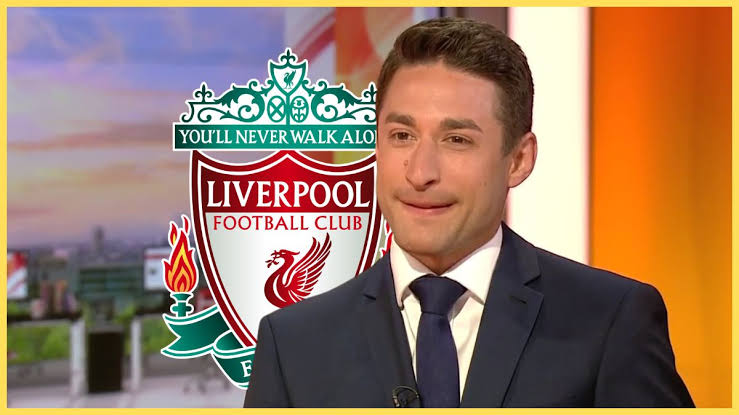
In the unforgiving theater of modern football transfers, timing is everything. A few days can mean the difference between securing a generational talent and watching them slip through your fingers into the arms of a rival. For Liverpool Football Club in January 2022, this reality came crashing down with alarming clarity when intelligence reached Anfield that Tottenham Hotspur were circling like vultures around their carefully guarded target: Luis Díaz of FC Porto.
What followed was a masterclass in crisis management and strategic pivoting that would fundamentally alter the trajectory of one of the most memorable seasons in Liverpool’s storied history. The Colombian winger’s unexpected early arrival at Anfield would become the catalyst for a campaign that promised everything, delivered substantial success, yet ultimately left an entire fanbase wondering what might have been.
Football’s transfer market operates much like an intricate spy network, where information is currency and timing can determine the fate of entire seasons. Liverpool’s interest in Luis Díaz had been an open secret among football’s inner circles for months, with the club’s scouting network having identified the Colombian as the perfect addition to Jürgen Klopp’s attacking arsenal. The plan was methodical, calculated, and designed for summer implementation – a textbook example of how modern clubs approach high-value acquisitions.
Michael Edwards, Liverpool’s departing sporting director, had built his reputation on such measured approaches. The club’s recent transfer successes – from Mohamed Salah’s bargain acquisition to Virgil van Dijk’s record-breaking defensive reinforcement – had all followed similar patterns of patient observation, careful negotiation, and strategic timing. Díaz was meant to be the crown jewel of this philosophy, a summer signing that would provide Klopp with renewed attacking options for the 2022-23 campaign.
However, the modern transfer market waits for no one, and Liverpool’s careful planning was about to be tested by the most unwelcome of developments. Tottenham’s interest in Díaz wasn’t merely speculative – it was concrete, immediate, and backed by the financial resources necessary to disrupt Liverpool’s timeline. The North London club, under the guidance of sporting director Fabio Paratici, had identified the same qualities in Díaz that had captivated Liverpool’s scouts: pace, creativity, versatility, and an eye for goal that could transform any attacking unit.
The intelligence reaching Liverpool’s hierarchy painted a concerning picture. Tottenham weren’t simply monitoring Díaz; they were preparing to move, with preliminary discussions already underway with Porto’s negotiators. For a club that prided itself on meticulous planning and strategic patience, the prospect of losing a primary target to a Premier League rival represented an unacceptable outcome.
The decision to accelerate Díaz’s acquisition required Liverpool to abandon months of careful preparation and thrust themselves into the chaotic world of mid-season transfers. January signings carry inherent risks – players struggle with adaptation, disrupted pre-seasons affect fitness levels, and the pressure to deliver immediate results can overwhelm even the most talented individuals. Yet faced with the alternative of watching Díaz join Tottenham, Liverpool’s leadership made the bold decision to act.
Jürgen Klopp, typically cautious about mid-season disruptions to his carefully balanced squad, gave his blessing to the accelerated timeline. The German coach had witnessed firsthand the transformative impact that the right signing could have on a campaign, having benefited from similar January acquisitions throughout his managerial career. His tactical system, built on high-intensity pressing and rapid transitions, was particularly suited to accommodating versatile attackers who could contribute across multiple positions.
The negotiation process with Porto became a high-stakes poker game played out against the backdrop of Liverpool’s ongoing quadruple pursuit. Every day of delay increased the risk of Tottenham’s intervention, while every concession to Porto’s demands ate into Liverpool’s carefully managed transfer budget. The Portuguese club, aware of the competitive dynamics at play, drove a hard bargain that reflected Díaz’s value as one of European football’s most promising talents.
Financial fair play considerations added another layer of complexity to the negotiations. Liverpool’s recent investments in squad development had left little margin for error, requiring creative structuring of the deal to comply with regulatory requirements while satisfying Porto’s valuation. The final agreement, reportedly worth up to £50 million including add-ons, represented a significant commitment to a player they had originally planned to assess more thoroughly.
Liverpool’s decision to fast-track Díaz’s arrival was driven by more than just competitive paranoia – it was underpinned by the intoxicating possibility of achieving something unprecedented in English football. As January 2022 dawned, the Reds found themselves competing seriously across four different competitions, each offering its own unique challenges and rewards.
The Premier League title race was developing into one of the most compelling in recent memory, with Manchester City setting a relentless pace that demanded perfection from their pursuers. Liverpool’s response had been characteristically emphatic, stringing together victories with the kind of consistency that had become their trademark under Klopp’s guidance. Yet the demanding fixture list was beginning to test the squad’s depth, particularly in attacking areas where rotation options were limited.
The Champions League represented Liverpool’s most prestigious objective, offering the chance to add to their 2019 triumph with another European crown. Their progression through the group stage had been impressive, but the knockout rounds would demand tactical flexibility and squad rotation that Díaz’s arrival could facilitate. The Colombian’s experience in European competition with Porto made him an immediately viable option for the continent’s premier tournament.
Domestically, Liverpool’s cup campaigns were gathering momentum with the kind of purposeful progression that suggested genuine silverware ambitions. The League Cup offered the most immediate opportunity for success, while the FA Cup represented a chance to claim England’s oldest national trophy. Both competitions would require significant squad rotation, making Díaz’s versatility an invaluable asset in the months ahead.
The mathematics of competing across four fronts were daunting. Liverpool would need to navigate approximately 20 crucial matches across a three-month period, each carrying enormous significance for their ultimate objectives. Squad depth, tactical flexibility, and mental resilience would all be tested to their limits. Díaz’s arrival provided a crucial injection of quality and options that could prove decisive in the campaign’s outcome.
Luis Díaz’s integration into Liverpool’s system defied the conventional wisdom surrounding January transfers. Where most mid-season acquisitions require months of adjustment and gradual introduction, the Colombian hit the ground running with a confidence and understanding that suggested he had been part of the squad for years rather than weeks.
His debut came amid the controlled chaos of Anfield, where 50,000 voices welcomed him into one of football’s most intimidating atmospheres. The pressure could have overwhelmed a lesser player, but Díaz embraced the intensity with the kind of fearless enthusiasm that had first attracted Liverpool’s attention. His first touches, his movement patterns, and his willingness to attempt the spectacular all aligned perfectly with the crowd’s expectations and Klopp’s tactical requirements.
The tactical fit was perhaps the most remarkable aspect of Díaz’s early Liverpool career. Klopp’s system demands specific attributes from its wide players: pace to stretch defenses, work rate to contribute defensively, creativity to unlock stubborn opponents, and intelligence to make the right decisions in crucial moments. Díaz possessed all of these qualities in abundance, allowing him to slot seamlessly into established patterns of play without requiring significant tactical adjustments.
His relationship with Liverpool’s established stars developed organically, with players like Mohamed Salah, Sadio Mané, and Roberto Firmino immediately recognizing his potential to enhance their own performances. The Colombian’s unselfish approach to the game, his willingness to create opportunities for teammates, and his ability to press effectively without the ball all endeared him to a dressing room built on collective commitment.
Training ground reports painted a picture of a player hungry to prove himself worthy of his new surroundings. Díaz’s work ethic impressed coaching staff accustomed to high standards, while his technical ability allowed him to thrive in the intense small-sided games that formed the backbone of Klopp’s preparation methods. Within weeks of his arrival, he was being discussed not as a new signing finding his feet, but as an established member of the squad contributing to their biggest objectives.
The League Cup provided Díaz with his first taste of English football’s unique pressures and rewards. Liverpool’s path to Wembley had been fraught with challenges, requiring victories over Premier League opposition and navigating the kind of fixture congestion that tests squad depth to its limits. Díaz’s availability provided Klopp with crucial tactical options, allowing for rotation without sacrificing quality or disrupting established patterns of play.
His contributions to the League Cup triumph were multifaceted, extending beyond goals and assists to encompass the kind of intangible qualities that separate good players from great ones. His presence on the pitch changed the dynamic of Liverpool’s attacking play, forcing opposition defenses to account for another genuine goal threat while creating space for his more established teammates. The psychological impact of his arrival cannot be understated – both teammates and opponents were forced to recalibrate their approaches to accommodate this new variable in Liverpool’s tactical equation.
The final against Chelsea at Wembley showcased Díaz’s big-game temperament and his ability to perform under the most intense pressure. His energy and creativity provided the spark that helped Liverpool prevail in a grueling encounter that went to a penalty shootout. The image of him celebrating with the trophy, just weeks after his arrival from Portugal, encapsulated the fairy-tale nature of his early Liverpool career.
The FA Cup campaign presented different challenges but similar opportunities for Díaz to demonstrate his value to the squad. The competition’s unique demands – lower-league opponents with nothing to lose, potential giant-killings, and the pressure of expectation – required a different kind of mental approach. Díaz’s experience in Portuguese football, where underdogs regularly challenged established powers, served him well in navigating these psychological minefields.
His versatility proved crucial as Liverpool progressed through the rounds, with Klopp able to deploy him in various positions depending on tactical requirements and opposition threats. Whether starting on the left wing, cutting inside from the right, or operating as a false nine, Díaz adapted his game to serve the team’s needs while maintaining the individual brilliance that had first attracted Liverpool’s attention.
The FA Cup final against Chelsea provided another opportunity for Díaz to showcase his big-game credentials. His performance was emblematic of Liverpool’s collective approach – technically excellent, tactically disciplined, and emotionally intelligent. The victory represented not just another trophy for the club’s collection, but validation of their January transfer strategy and proof that Díaz was already an integral part of their success.
Liverpool’s Premier League campaign developed into one of the most compelling title races in the competition’s history, with Manchester City setting a pace that demanded near-perfection from their pursuers. The mathematical reality was stark: every dropped point carried enormous significance, every victory was essential, and every performance was scrutinized for signs of weakness or decline.
Díaz’s contribution to this title pursuit was immediate and substantial. His goals in crucial matches, his assists in tight encounters, and his general impact on the team’s attacking rhythm all helped maintain the relentless consistency required to compete with Pep Guardiola’s machine-like City operation. The Colombian’s arrival had provided Liverpool with a new dimension to their attacking play, offering pace, creativity, and unpredictability that kept opponents guessing.
The psychological boost of his signing cannot be understated. Liverpool’s squad, already confident in their abilities, received additional belief from the knowledge that their club was willing to make significant investments to support their ambitions. Díaz’s immediate impact validated this faith, demonstrating that he was not merely a luxury addition but an essential component of their title challenge.
Individual matches took on enormous significance in the context of the season-long battle with City. Díaz’s contributions in victories over traditional top-six opponents, his impact in difficult away fixtures, and his ability to create chances against defensive opponents all played crucial roles in Liverpool’s ability to maintain their pursuit of the title. Every goal, every assist, every moment of individual brilliance contributed to the collective effort required to challenge City’s supremacy.
The fixture congestion created by Liverpool’s success across multiple competitions placed enormous demands on squad rotation and management. Díaz’s versatility and fitness levels allowed Klopp to maintain consistency in selection while managing the physical demands on his players. His ability to perform at a high level whether starting matches or making crucial interventions from the bench proved invaluable throughout the campaign.
As the season reached its climax, the margins for error became increasingly small. City’s relentless consistency meant that Liverpool could afford no slip-ups, no off days, no moments of complacency. The pressure was immense, but Díaz thrived in this environment, producing some of his best
The final reckoning of Liverpool’s Premier League campaign would be determined by the finest of margins – a single point that separated triumph from heartbreak, success from failure, vindication from regret. After 38 matches, 180 minutes of football, and countless individual moments of brilliance and despair, Manchester City finished just one point ahead of their relentless pursuers.
For Díaz and his teammates, the mathematical reality was almost incomprehensible. So many moments throughout the season could have altered the final outcome: missed penalties, controversial refereeing decisions, last-minute equalisers, defensive lapses, and tactical miscalculations. The Colombian’s own contributions – goals that secured crucial points, assists that broke deadlocks, performances that inspired comebacks – had all played their part in bringing Liverpool within touching distance of the title.
The emotional impact of falling so narrowly short was profound. This wasn’t a season where Liverpool had fallen away due to poor form or tactical shortcomings; they had maintained an extraordinary level of consistency that would have won the title in most other campaigns. Their 92 points would have been sufficient for the championship in 24 of the previous 30 Premier League seasons, yet it left them empty-handed in 2022.
Díaz’s individual performance levels throughout the title race had been remarkable. His adaptation to English football’s intensity, his ability to perform in crucial matches, and his consistency across different competitions had all exceeded expectations. The Colombian had not just met the challenge of his January arrival; he had embraced it with a maturity and professionalism that belied his relative inexperience in English football.
The disappointment was compounded by the knowledge that this Liverpool squad, with Díaz now firmly established as a key component, might not get another opportunity to challenge for the title under such favorable circumstances. The margins in modern football are so fine that even small changes – injuries, transfers, tactical adjustments – can dramatically alter competitive dynamics.
The Champions League final at the Stade de France represented the culmination of Liverpool’s European campaign and their last remaining opportunity to add the most prestigious trophy in club football to their collection. For Díaz, it was the chance to cap his remarkable debut season with the ultimate prize, validating his decision to join Liverpool and cementing his status as one of European football’s premier talents.
The buildup to the match was dominated by talk of Liverpool’s potential quadruple, with Díaz positioned as the January signing who had made it all possible. His journey from Porto to Paris in just four months captured the imagination of football romantics worldwide, representing the kind of fairy-tale narrative that the sport occasionally provides.
Real Madrid, however, arrived in Paris with their own compelling storyline. Los Blancos had navigated a treacherous path to the final, overcoming Paris Saint-Germain, Chelsea, and Manchester City in successive rounds with performances that showcased their remarkable resilience and big-game experience. Their squad, led by veterans like Luka Modrić, Toni Kroos, and Karim Benzema, possessed the kind of Champions League DNA that money cannot buy.
The match itself unfolded as a tactical chess game between two of European football’s most sophisticated coaches. Jürgen Klopp’s high-intensity pressing met Carlo Ancelotti’s tactical pragmatism in a contest that would be decided by fine margins and crucial moments. Díaz’s role in Liverpool’s game plan was central – his pace and directness were designed to stretch Madrid’s experienced defense and create opportunities for his teammates.
Individual moments took on enormous significance in the context of the match. Díaz’s runs behind the defense, his attempts to create chances from wide positions, and his defensive contributions all formed part of Liverpool’s collective effort to break down Madrid’s resistance. The Colombian’s energy and creativity posed constant problems for Madrid’s defenders, yet the breakthrough remained frustratingly elusive.
The psychological pressure of the occasion was immense, with both teams aware that 90 minutes of football could define their entire seasons. For Díaz, performing on such a stage represented the ultimate test of his adaptation to elite-level football. His composure and technical ability under pressure demonstrated why Liverpool had been so determined to secure his signature, even if the final result didn’t reflect his individual contributions.
Real Madrid’s victory in Paris was built on the kind of tactical discipline and clinical finishing that had characterized their Champions League campaigns throughout history. Vinícius Júnior’s decisive goal, created by a moment of individual brilliance from Federico Valverde, exemplified the fine margins that separate success from failure at the highest level of football.
For Liverpool and Díaz, the defeat represented more than just the loss of a trophy – it was the crushing realization that their extraordinary season had fallen just short of sporting immortality. The quadruple had been within touching distance, closer than any English club had come to achieving such an unprecedented feat, yet it ultimately slipped away in the most heartbreaking fashion possible.
The individual impact on Díaz was particularly poignant. Having arrived in January with the explicit ambition of helping Liverpool achieve something unprecedented, the Colombian had to watch as the final piece of the puzzle proved just beyond reach. His performances throughout the Champions League campaign had been exemplary, contributing to victories over Inter Milan, Benfica, and Villarreal that had secured Liverpool’s path to Paris.
The broader implications of the defeat extended beyond immediate disappointment. Liverpool’s failure to secure the Champions League meant that their season, despite its remarkable achievements, would be remembered as much for what they didn’t win as for what they did. The domestic cup double, while significant, couldn’t fully compensate for missing out on the sport’s two most prestigious prizes by such narrow margins.
The experience would undoubtedly serve as motivation for future campaigns, providing Díaz and his teammates with the kind of painful memory that can fuel subsequent success. The knowledge that they had come so close to achieving something unprecedented would either inspire them to greater heights or serve as a source of lasting regret, depending on how they chose to process the disappointment.
Díaz’s integration into Liverpool’s tactical system represented more than just the addition of another talented player – it marked an evolution in Klopp’s approach that would have lasting implications for the team’s development. The Colombian’s arrival provided the German coach with new tactical options and forced adaptations that enhanced the team’s overall versatility.
The traditional Liverpool front three of Mohamed Salah, Roberto Firmino, and Sadio Mané had been the cornerstone of the team’s success for several seasons, but Díaz’s arrival created healthy competition and tactical flexibility. His ability to operate effectively across multiple positions allowed Klopp to rotate his attacking options without compromising the team’s overall structure or effectiveness.
The psychological impact on Liverpool’s established attackers was predominantly positive, with the added competition spurring improved performances rather than creating destructive rivalry. Díaz’s unselfish approach to the game and his willingness to adapt his role based on tactical requirements endeared him to teammates who recognized his potential to enhance their collective success rather than threaten their individual positions.
Training ground innovation became a key component of integrating Díaz into established patterns of play. Klopp and his coaching staff developed specific drills and tactical scenarios designed to maximize the Colombian’s strengths while maintaining the team’s overall cohesion. These adaptations would prove crucial not just for the remainder of the 2021-22 season but for Liverpool’s long-term tactical development.
The wider implications of Díaz’s successful integration provided validation for Liverpool’s broader recruitment strategy. The club’s ability to identify, acquire, and successfully integrate a player of his caliber during a crucial period of the season demonstra







